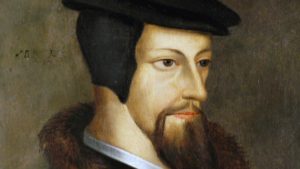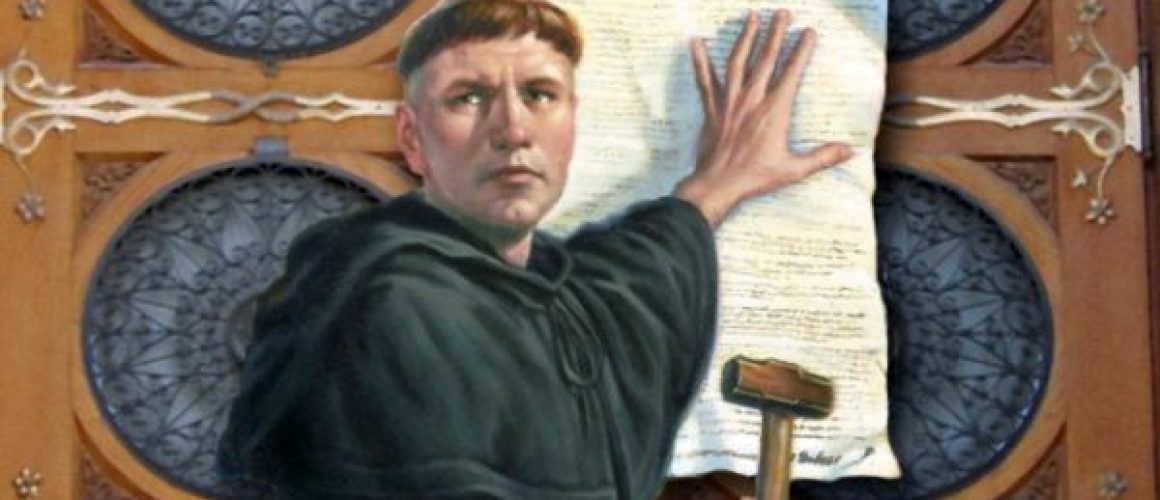Martin Luther – #mancrushmonday
 Martin Luther lived at a time when having an opinion different than that of the catholic church could cost you your head.
Martin Luther lived at a time when having an opinion different than that of the catholic church could cost you your head.
After observing corruption and hypocrisy, He formed opinions about God and the Bible that flew in the face of the religious elite of his day.
So he wrote them down, and then literally NAILED THEM TO THE DOOR of the catholic church.
That brave act of defiance completely and in many ways changed the world. And even though the catholic church rejected Luther’s new teachings, many of his challenges led the church to clean up and reform many of its practices.
According to Wikipedia
Martin Luther (/ˈluːθər/;[1] German: [ˈmaɐ̯tiːn ˈlʊtɐ] ( listen); 10 November 1483 – 18 February 1546) was a German professor of theology, composer, priest, monk[2] and a seminal figure in the Protestant Reformation.
Luther came to reject several teachings and practices of the Roman Catholic Church. He strongly disputed the claim that freedom from God’s punishment for sin could be purchased with money, proposing an academic discussion of the practice and efficacy of indulgences in his Ninety-five Theses of 1517. His refusal to renounce all of his writings at the demand of Pope Leo X in 1520 and the Holy Roman Emperor Charles V at the Diet of Worms in 1521 resulted in his excommunication by the Pope and condemnation as an outlaw by the Emperor.
Luther taught that salvation and, subsequently, eternal life are not earned by good deeds but are received only as the free gift of God’s grace through the believer’s faith in Jesus Christ as redeemer from sin. His theology challenged the authority and office of the Pope by teaching that the Bible is the only source of divinely revealed knowledge from God[3] and opposed sacerdotalism by considering all baptized Christians to be a holy priesthood.[4]Those who identify with these, and all of Luther’s wider teachings, are called Lutherans, though Luther insisted on Christian or Evangelical as the only acceptable names for individuals who professed Christ.
His translation of the Bible into the vernacular (instead of Latin) made it more accessible to the laity, an event that had a tremendous impact on both the church and German culture. It fostered the development of a standard version of the German language, added several principles to the art of translation,[5] and influenced the writing of an English translation, the Tyndale Bible.[6] His hymns influenced the development of singing in Protestant churches.[7] His marriage to Katharina von Bora, a former nun, set a model for the practice of clerical marriage, allowing Protestant clergy to marry.[8]
Check out these quotes from Martin Luther:

“To be a Christian without prayer is no more possible than to be alive without breathing.”
“I have so much to do that I shall spend the first three hours in prayer.”
“You are not only responsible for what you say, but also for what you do not say.”
“Faith is a living, daring confidence in God’s grace, so sure and certain that a man could stake his life on it a thousand times.”
“I know not the way God leads me, but well do I know my Guide.”
“I have held many things in my hands, and I have lost them all; but whatever I have placed in God’s hands, that I still possess.”
“I am more afraid of my own heart than of the pope and all his cardinals. I have within me the great pope, Self.”
“Be a sinner and sin strongly, but more strongly have faith and rejoice in Christ.”
“Whatever your heart clings to and confides in, that is really your God.”
“The Bible is alive, it speaks to me; it has feet, it runs after me; it has hands, it lays hold of me.”
“If you want to interpret well and confidently, set Christ before you, for He is the man to whom it all applies, every bit of it.”
“The Gospel cannot be truly preached without offense and tumult.”
“To find Christ in such poverty, and what his swaddling clothes and manger signify, are explained … that his poverty teaches how we should find him in our neighbors, the lowliest and the most needy; and his swaddling clothes are the holy Scriptures; that in actual life we should incline to the needy; and in our studies and contemplative life only to the Scriptures; in order that Christ alone may become the man of both lives and that he may everywhere stand before us.”
“A Christian man is the most free lord of all, and subject to none; a Christian man is the most dutiful servant of all, and subject to everyone.”




